Body Kindness author Rebecca Scritchfield shares her journey towards finally accepting her body.
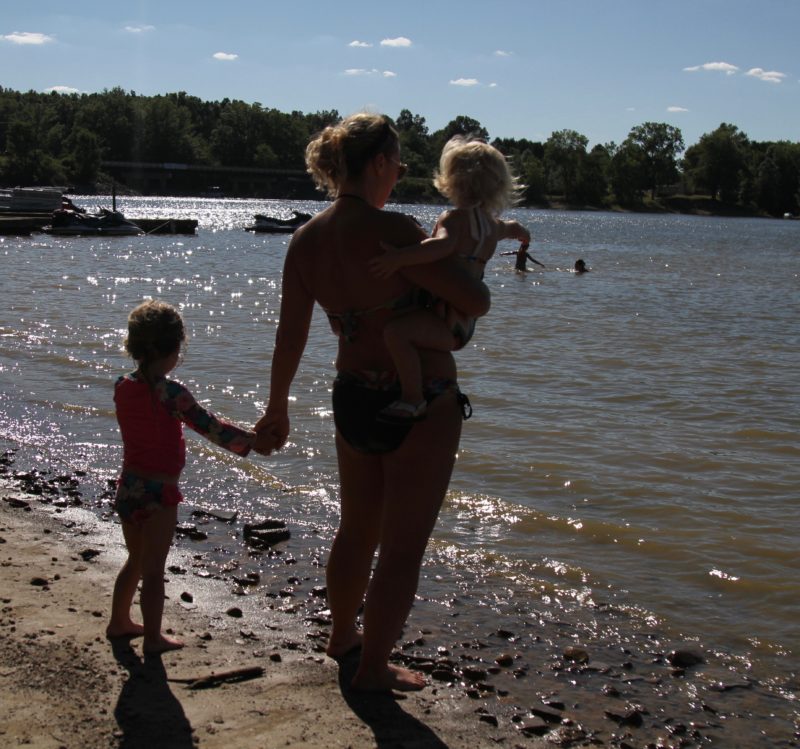
With my two girls at Berlin Lake August, 2016
I wore a bathing suit this weekend. While that’s not unusual for me—a water-loving mom of two girls just learning to swim—this was definitely different. This weekend, I returned to Berlin Lake, a place my family retreated many summer days of my childhood. This is the place my body hatred began. Where I first feared becoming fat, where I got the urge “watch myself” around food, to promise I would exercise “off” what I just ate, and where I started to believe I was more loveable when I felt thin.
I came to apologize and to make amends with a younger version of myself. I now understand that I was trying to do all the right things. But instead I got it all twisted and became another victim of our society’s harsh judgment of females—we’re only good when we look great (or at least putting all our efforts into the pursuit).
As I stood there gazing at the glass-like surface of the water, feeling the tug of each daughter’s hand wrapped around my index fingers, I wondered how I went from the curly-haired, curious girl who spent hours making ashtrays for my grandpa from beach clay, to the one who congratulated herself for eating less than everyone else at the picnic, or chastised herself for eating too much? The truth is, I don’t really know. Something took hold the summer of 1990 that would lead to years of hurtful self-talk, lots of dieting, and a years-long sadomasochistic relationship with a scale.
It was probably orthoexia before it became an actual word. I ate healthy food when it was around, but calorie counting (i.e. intentional food restriction) was my jam. I chose exercise classes over time with friends to crank up my calorie burn. I hid my disordered behaviors well in my “normal-looking” body and nobody, not even my best friend, heard me say out loud the mean words I said to myself. The way I lived my life wasn’t in the spirit of good health and only fueled my bad body image. I was building a tiny room, brick by brick, with every new rule I created. It became my own little prison that kept me from fully experiencing life at 12, 13, 14 . . . and many years to come. It was that piece of cake I avoided at the birthday party, the dance I didn’t attend, and the food I ate in secret because I was starving.
My body image problems stayed with me throughout high school and college. If I’m 100% honest, they’re still there—but different, like a shadowy part of my past capable of rearing it’s ugly head once in awhile. Part of me wants to say “be grateful you never had an eating disorder,” (I am.) But that’s actually not good enough for me. I spent years entangled in body dissatisfaction disguised as healthy habits. It wasn’t dedication or discipline. It was a delusion. I wasn’t taking care of myself the ways one should—making choices from a place of love and respect. I wasn’t connecting to my body to respond to its needs. I was dissociating from it to somehow make it better, prettier, and more worthy.
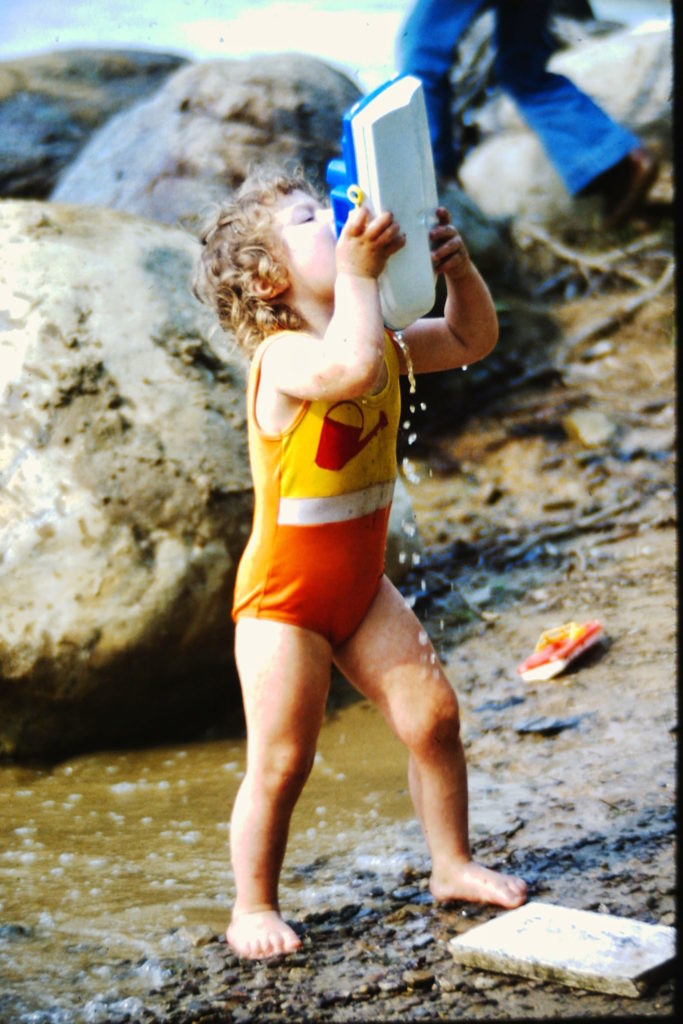
Carefree at Berlin Lake, circa 1979
The reality is I was just a girl in a body, no better or worse than anyone else—perfectly unique and perfectly normal. The real beauty in life is in our diversity of body shapes and sizes—and our freckles, wrinkles, and bumpy noses. We don’t need to Photoshop a more perfect version of who we really are. We need to treat our bodies with kindness, and when we do, the choices we make are naturally good for us. It would take decades for me to learn this lesson. Even building a career in nutrition and fitness wasn’t enough. I needed to find my happiness and satisfaction in the study of positive psychology, the practices of mindfulness and self-acceptance, yoga, and the school of not giving a damn about what other people think anymore!
Standing there on the shore, a grown woman with more confidence and compassion than my childhood self, I held my emotional battle scars as evidence of the most meaningful insight of my life. You can’t hate yourself healthy. But you can drop your weapons, call a truce, and move forward. So on this rare return to Berlin Lake, I did just that. There was no ceremonious Baptism in the waters absolving me of my body sins. It was more like a silent, gentle embrace with my inner child, “I’m sorry I hurt you. I’m glad you’re OK. I love you.” And then it was over.
This weekend, I wore a bathing suit at Berlin Lake. I cried a mixed emotion of sadness for my suffering and gratitude for the strength it gave me. Because of my difficulties I will make sure my children grow to love and respect their bodies, even as they change, even when they don’t like what they see in the mirror. I will teach them it’s OK to feel uncomfortable, imperfect, ugly, or gross. Those feelings are fleeting moments bound to be replaced by more positive emotions after a caring word of self-love, a tiny moment to pause and recall your boundless value beyond looks.
If you have made it this far, dear reader, I know you can relate to my story. Here’s my wish for you—a challenge of sorts. Summer officially starts on Wednesday, June 21 this year. The way I see it, you have until then to make peace with your inner child—or any version of yourself you have wronged. You need to have your moment so you can feel the freedom of forgiveness and brick by brick release yourself from your isolation. There’s no complicated list of steps to follow, just one simple action. Say “I’m sorry,” really mean it and get back to engaging fully in your life.
 About the Book:
About the Book:
Imagine a graph with two lines. One indicates happiness, the other tracks how you feel about your body. If you’re like millions of people, the lines do not intersect. But what if they did?
This practical, inspirational, and visually lively book shows you how to create a healthier and happier life by treating yourself with compassion rather than shame. It shows the way to a sense of well-being attained by understanding how to love, connect, and care for yourself—and that includes your mind as well as your body.
Body Kindness is based on four principles.
WHAT YOU DO: the choices you make about food, exercise, sleep, and more
HOW YOU FEEL: befriending your emotions and standing up to the unhelpful voice in your head
WHO YOU ARE: goal-setting based on your personal values
WHERE YOU BELONG: body-loving support from people and communities that help you create a meaningful life
With mind and body exercises to keep your energy spiraling up and prompts to help you identify what YOU really want and care about, Body Kindness helps you let go of things you can’t control and embrace the things you can by finding the workable, daily steps that fit you best. Think of it as the anti-diet book that leads to a more joyful and meaningful life!
Buy the Book
Amazon | B&N | Indiebound | Workman

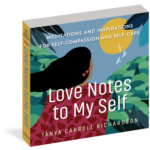
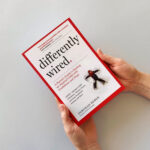
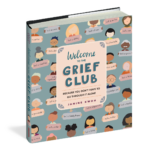
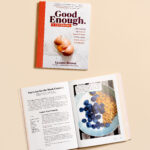
No Comments